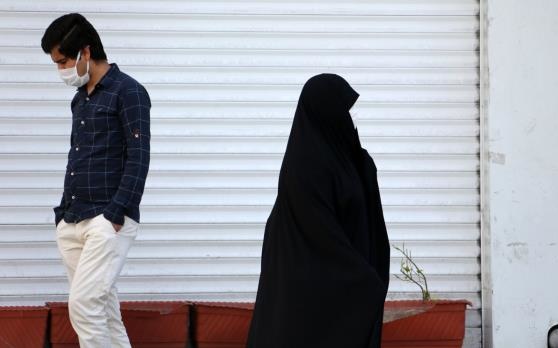Pedestrians walk past a closed shop in Tehran, Iran (Atta Kenare/AFP/Getty)
With Iran’s economic problems compounded by Coronavirus, President Hassan Rouhani appeals to the European Union for help over trade a loan from the International Monetary Fund.
Rouhani sent his message through a Monday call with Italian Prime Minister Giuseppe Conte.
In these difficult circumstances, the US pressure on the Iranian people has been more inhumane than ever, and its continuation is a brutal crime against a great nation and against all human principles and international regulations.
The President appealed for use of the INSTEX mechanism for trade with the EU, bypassing comprehensive sanctions imposed by the Trump Administration in November 2018.
The European Union launched INSTEX on January 31, 2019, for Iranian oil and other commodities and goods. However, Iran objected to the provisions because they included EU criticism of Tehran’s missile research and development, activities in the Middle East, and alleged involvement in bomb plots and assassinations in Europe.
INSTEX was used for the first time on March 31, with a transaction sending medical supplies to the Islamic Republic. But Rouhani opined, “Unfortunately, the financial mechanism designed by Europe has not yet been able to take a significant and effective step and play a role.”
Rouhani also appealed for European support to override any US objection over a $5 billion loan from the IMF: “We expect European countries, especially Italy, to take the necessary steps towards this violation of the rules in these difficult circumstances.”
He said that, if the Europeans backed Tehran, Iran would lift suspensions of its commitments under the 2015 nuclear deal.
Since last June, in response to US sanctions, Tehran has broken the deal’s limit on stocks of 3.67% uranium and stepped up production to 4.5%. Advanced centrifuges have been installed.
However, Iran has yet to return to its pre-deal production of 20% uranium, which potentially can be further enriched to military-weapons grade of more than 90%.
According to Rouhani’s office, Conte responded:
Your problems are well understood by us because we are both involved in a common problem and we welcome the exchange of common experiences between the two countries against Coronavirus….
We are ready to cooperate with Iran on the JCPOA [nuclear deal] and strengthen the EU’s financial mechanism and the serious participation of countries in this field.
Even before the onset of Coronavirus, Iran was struggling with a fall of between 80% and 95% of oil exports since April 2018. Production, investment, trade, and employment have been hindered.
Rouhani has balanced between the need to contain the virus and the Supreme Leader’s command for a year of “Surge in Production”.
Iran’s Health Ministry raised the official death toll to 5,209 on Monday; however, Parliament’s research committee said last week that the true number may be twice as high.
On April 11, Rouhani launched “Smart Social Distancing” with the reopening of “low-risk” businesses across most of Iran. On Saturday, the provisions were applied to the capital Tehran.
See also Iran Daily, April 20: Tehran Leader — Regime Undercounting Coronavirus Cases


“Rouhani also appealed for European support to override any US objection over a $5 billion loan from the IMF: “We expect European countries, especially Italy, to take the necessary steps towards this violation of the rules in these difficult circumstances.””
Nobody believes you or the rest of you lying bastard mullahs. And now your empty pocket is no longer of any benefit to anyone.